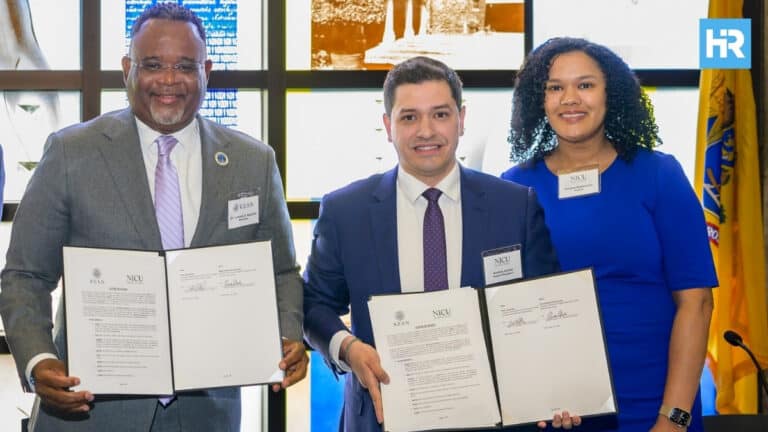
On July 23, 2025, New Jersey City University’s Board of Trustees officially appointed Andrés Acebo as the 13th president of the institution. This decision followed a unanimous vote at the board’s regular meeting. Acebo had held the interim title since January 17, 2023, during which time he led the university through a period the board identified as the most challenging in its 98-year history.
The board cited several institutional improvements under Acebo’s leadership, including the reduction of university debt, increased enrollment, and improved credit ratings. Founded in 1927, NJCU had not previously received a positive financial outlook from any major rating agency before this tenure.
- On July 23, 2025, NJCU’s Board unanimously appointed Andrés Acebo as the 13th president after serving as interim since January 17, 2023.
- Under Acebo’s leadership, NJCU achieved its first-ever positive outlook from Moody’s, reduced debt by tens of millions, and saw three semesters of transfer growth.
- NJCU implemented major reforms, including the expansion of general education credits, guaranteed schedules, and the inclusion of textbook costs in tuition, effective Fall 2024.
Moody’s and Fitch Issue Credit Rating Improvements
Between February 2024 and May 2025, NJCU’s financial outlook was revised upward three times. Moody’s changed its rating from negative to stable in February 2024, and Fitch assigned a stable outlook in November 2024. In May 2025, Moody’s issued an additional upgrade, raising the outlook to positive. This was the first time NJCU had received a positive rating from Moody’s.
Acebo also oversaw a reduction of tens of millions of dollars in institutional debt and a pattern of enrollment growth, with three straight semesters of double-digit increases in transfer student admissions.
Additionally, during Acebo’s interim presidency, NJCU announced plans to merge with Kean University, creating a new academic entity identified as Kean Jersey City.
Institutional Planning and Curriculum Reform
During his time as interim president, Acebo introduced four major planning documents that guided NJCU’s recovery and future direction. These included the Recovery and Revitalization Plan released in April 2023, followed by the Academic Master Plan in February 2024, the Strategic Enrollment Plan in April 2024, and the Student Development and Community Engagement Strategic Plan in December 2024.
In Spring 2024, the university changed its general education requirements to accept all courses from the New Jersey Council of County Colleges (NJCCC) general education list, regardless of direct equivalency. This reform passed with 95% support from NJCU’s University Senate. According to the university, this policy made NJCU the most transfer-friendly public institution in New Jersey.
Changes included a guarantee of fixed class schedules, introduced in Spring 2024, and the integration of textbook costs into tuition beginning Fall 2024.
Student Outcomes and Regional Partnerships
In 2023 and 2024, NJCU maintained high national and state rankings for social mobility. Listed as the top public university in New Jersey and placed 10th nationally in CollegeNET’s 2023 Social Mobility Index, it remained in the state’s top spot and stayed within the national top 20 in 2024.
Graduation totals under Acebo’s leadership included 1,667 students in Spring 2024—an 8.2% increase in bachelor’s degrees from the previous year—and 1,544 more students completing degrees in 2025.
NJCU expanded its regional partnerships during this time. It launched the Hudson Connect Program in collaboration with Hudson County Community College and signed agreements with Essex County College and Mercer County Community College.
In October 2024, the university partnered with the A. Harry Moore Laboratory School to open the Life Independence and Future Transitions (LIFT) program in Grossnickle Hall. In November 2024, NJCU signed an academic agreement with the Jersey City Board of Education to support the Visual and Performing Arts Program in local public schools.
The university also established the NJCU President’s Community Advisory Council in August 2024. Acebo formalized collaborations with several labor, civic, and educational groups, including the New Jersey Education Association (NJEA), Hudson Building Trades, GLACO, AFT Local 1839, Jersey City POBA, Boys & Girls Clubs of Hudson County, the Statewide Hispanic Chamber of Commerce of New Jersey (SHCCNJ), and the Hudson County Latin American Chamber of Commerce (HCLACC).
Athletics Conference Change and Leadership Background
In March 2025, NJCU announced its departure from the New Jersey Athletic Conference (NJAC) and its entry into a new NCAA Division III conference formed by the eight schools in the City University of New York Athletic Conference (CUNYAC). NJCU became the first full-time member of this conference located outside the five boroughs of New York City.
Andrés Acebo is a graduate of Union City public schools in Hudson County and the son of Cuban exiles. He holds a Bachelor of Arts from Brown University and a Juris Doctor from Rutgers Law School. He is the youngest known individual to lead a public university in New Jersey and only the third Hispanic person to serve as president of a four-year public college in the state.
In May 2024, ROI-NJ named him the top influencer in higher education in New Jersey, and NJBiz ranked him fourth in its Education Power 50 list—the highest rank awarded to any college or university president in the state that year.
A formal investiture for President Acebo is scheduled to take place during the Fall 2025 semester.









